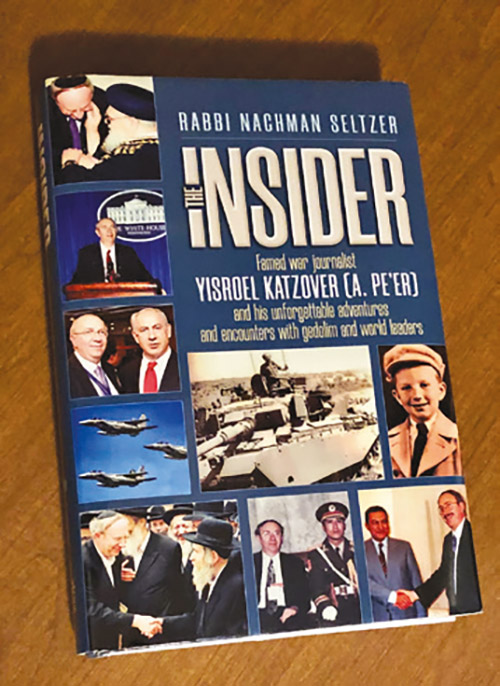
Reviewing “The Insider” by Rabbi Nachman Seltzer. Mesorah Publications Ltd. 2021. English. Hardcover. 430 pages. ISBN-13: 978-1422630051.
Before I start, let me make an admission.
Generally speaking, I’m not a big fan of biographies.
And I’m generally not great at getting through long (400-plus pages) books.
As my regular work involves news media, I’m a voracious consumer of daily newspapers—I read two in print, two via daily headlines emails—and a variety of weekly news media publications (most notably, The Jewish Link of course). I don’t often have or make time for big books. So when I do get through a big book, it’s a big deal. At least to me.
That said, I’m glad I made time to read “The Insider.” I found the book to be a delightful surprise, an easy read about a truly admirable man, with many unexpected revelations and insights that have enhanced my understanding of recent historic events in Israel and of Israeli and world leaders.
For decades Yisroel Katzover held a unique position in Israeli society, at the nexus of a few significant population groups and experiences. The son of two Holocaust survivors, raised in an observant community in Katamon (Jerusalem) in the pre- and post-War of Independence era, he went on to serve as a widely respected journalist, writing for both prominent secular and religious community publications. Katzover also served as an adviser to religious political parties and to numerous noted rabbonim. He also interviewed and got to know many of the leading elected officials in Israel.
Katzover covered all the significant military and diplomatic developments in Israel, from the Six-Day War in 1967 through the Netanyahu government’s covert acquisition of the Iranian regime’s nuclear archive in 2018, and got a front-row seat as many headline-grabbing events transpired.
There are a lot of fascinating stories in this book that make it well worth the time reading it. Here are three samples, to give you a sense of the flavor of the book.
Shimon Peres
After sharing a remarkable story of how Shimon Peres worked behind the scenes to secure vital information for Israel from a U.S. president, Katzover remarks: “I had long felt he was a special individual who possessed unique depths. I consider myself someone who was close to Peres and it’s possible I’m not completely objective about him.” (Pages 289-290). Katzover then relates how Peres told him one day, in the 1960s: “I want to tell you why I’m successful.” Peres shared that when he was a 4 year old, his grandfather (a rabbi in Poland) brought young Shimon to meet his rebbi, the Chafetz Chaim, who gave him a bracha that he’d be successful.
Katzover shared as well that Peres continuously worked to preserve the Israeli government law that shielded young men who are learning in yeshiva from being drafted into the army; many prominent rabbonim credited Peres with this effort. And it was of great pride for Peres, who said: “I don’t know what awaits me in the world to come. But when I get there, and they will ask me what I’ve accomplished in this world, one of the first things I’ll tell them is that I made it possible for bnei Torah to sit and learn.” (Page 291)
Vladimir Putin
After meeting with then-PM Netanyahu in the Kremlin on a sensitive matter, Putin asked to address the Israeli journalists who had accompanied him. He remarked: “I want to tell you a story that will explain why I feel the way I do about the Jewish people.” He then shared that he grew up in a poor family, living in a large apartment building, and his parents often worked long hours. A religious Jewish family lived across the hall and he’d play with their children. That family would invite Putin to eat dinner with them. “I feel much gratitude to that Jewish family until this day.” Putin went on to relate that he periodically meets with Rabbi Berel Lazar, the chief rabbi of Russia, who brings him boxes of matzah, which Putin enjoys throughout the year, saying: “They’re good for the cholesterol—good for my health.” (Pages 386-387)
The Lubavitcher Rebbe
Early in his career, Katzover met Rabbi Gershon Jacobson, founder and publisher of the Der Algemeiner Journal, the prominent Yiddish weekly newspaper in America. Learning Katzover is frum and speaks Yiddish, Reb Gershon enlisted him to write columns for the Journal. Reb Gershon also introduced Katzover to the Lubavitcher Rebbe, who met with him a few times and asked him to deliver messages at various points to different officers of the Israeli army. To help Katzover clarify some of the messages, the Rebbe gave him the number of his personal secretary, Rabbi Mordechai Hodakov, instructing Katzover to “call him anytime there is something you don’t understand.” (Pages 89-95).
These three samples offer a small taste of the richness of Katzover’s storied career and the adventures he’s been privileged to take. I enjoyed reading his biography and recommend it strongly to other readers who care about Israeli history, Jewish religious leadership (in Israel and in the U.S.), and the state of journalism in the State of Israel.
Harry Glazer can be reached at harryglazer615@gmail.com











